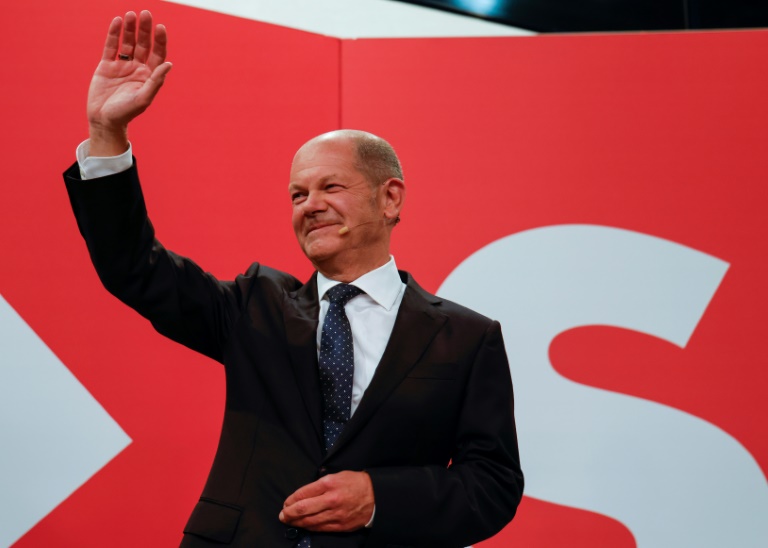German Finance Minister Olaf Scholz on Friday took a step closer to succeeding Angela Merkel as chancellor, as his Social Democrats, the Greens and liberal FDP announced a preliminary deal to form a new government.
The three parties have been holding talks since Scholz’s centre-left Social Democratic Party (SPD) won the general elections on September 26 with Merkel’s conservatives in second place as she prepares to leave politics.
“Overall, we can sense here that a new beginning is possible, brought about by the three parties that have come together here,” Scholz told reporters.
“We have agreed on a text from the exploratory talks,” he said, calling it a “very good result that clearly shows that a government that aims to ensure we achieve progress can be formed in Germany”.
Greens co-leader Annalena Baerbock said the initial agreement heralds a “coalition of progress” to “really use the next decade as a decade of renewal”.
The agreement that will form the basis of formal coalition talks all but means that Merkel’s CDU-CSU alliance is headed for the opposition benches after scoring their worst post-war election result.
CDU leader and chancellor hopeful Armin Laschet had recently said his party remains open to forming a governing coalition, but even his own job is hanging on a thread.
Facing their worst crisis in decades, the conservatives are planning a clean sweep of their leadership, with a congress by December to elect their new bosses.
Scholz, who is also Merkel’s vice chancellor, this week voiced confidence that the three-way talks involving his party will produce Germany’s next government before Christmas.
A coalition of SPD, Greens and FDP — known as “traffic-light” after the three parties’ red, green and yellow colours — has found favour with Germans, with 62 percent approving the constellation as the next federal government, according to a poll published Friday.
Scholz’s approval rating was even higher, as three in four said it was “good” for him to become chancellor.
– Everyone wins –
The imminent shift in Germany’s leadership to the centre-left comes as Europe’s biggest economy is grappling with the complex challenge of securing the country’s post-pandemic recovery.
Serious shortages in raw materials and components are already crimping growth, with factories of Germany’s vital automotive industry idled because of the supply issues.
While industry is urging state support to continue, a planned zero-emissions target by 2045 will require huge investments including building more sustainable energy capacity and greener transport options.
In their initial agreement, the three parties each appeared to have scored wins.
They pledged to not introduce any tax hikes while adhering to Germany’s no-new-debt rule, something the FDP had signalled was a red line for them.
But the Greens also secured a pledge to bring forward Germany’s exit from coal energy by eight years to 2030.
And the Social Democrats took the prize of raising minimum wage to 12 euros — a campaign promise pushed by Scholz.
During the formal negotiations, possibly starting next week, the parties will have to look into the finer details on how to finance Germany’s path towards a no-emissions future while not raising levies, at a time when the pandemic has already torn a hole in the treasury.
Nevertheless, all sides are eager to avoid a repeat of the 2017 election aftermath, when the FDP dramatically walked out of coalition talks with the conservatives and the Greens and it took months for a new government to take shape.
FDP chief Christian Linder, who was sharply criticised over the collapse in talks four years ago, said Friday that his party was “convinced that there has for a long time been no comparable opportunity to modernise the society, economy and state”.
Analysts believe that compromises likely to be made between the parties mean that Germany is unlikely to see a sharp lurch to the left.
“As finance minister since March 2018, Scholz has already shaped the German fiscal stance and its position in EU negotiations to a significant extent. Do not expect a sea change from his potential move into the chancellor’s office,” said Berenberg Bank’s analyst Holger Schmieding.
Rather, Germany will likely continue on its “gradual shift towards a flexible interpretation of rules, more spending at home and in Europe and more investment into the green and digital transformation, infrastructure and health care.”










